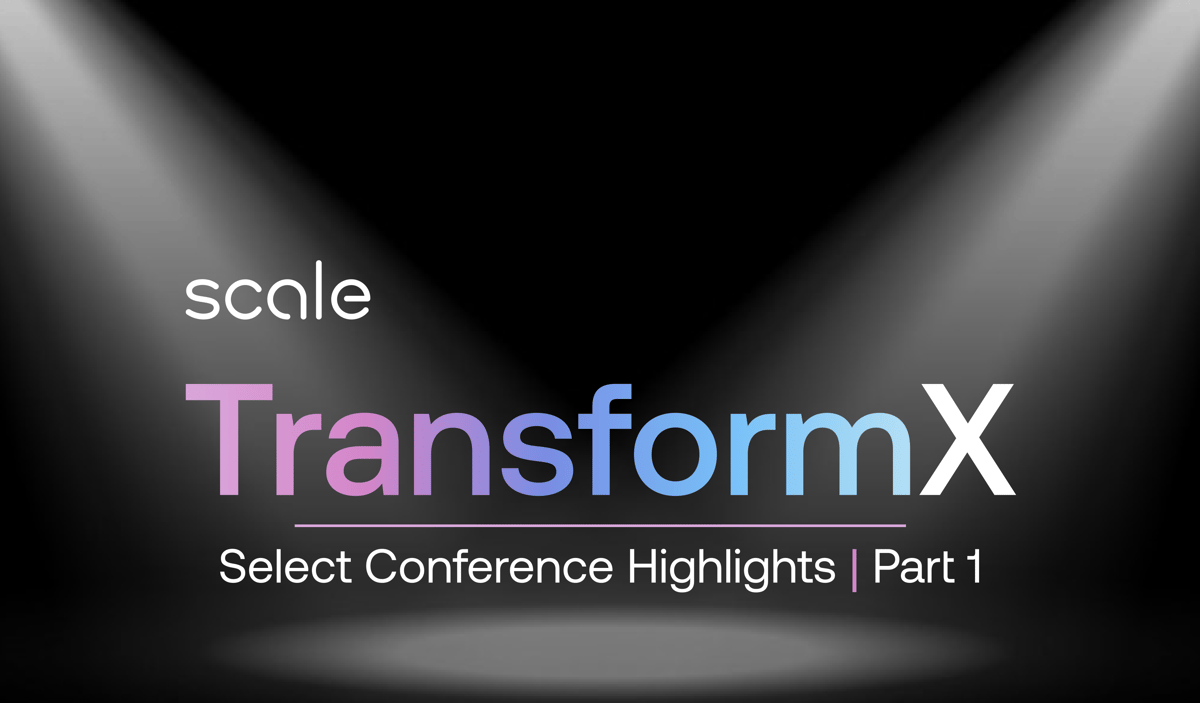Events
October 14, 2021
Highlights of Transform X (Part 1)

A review of some of the key conference takeaways

AI is Key to New Scientific Advances
One of the key themes we heard from multiple speakers is that AI and specifically Deep Learning (DL) is increasingly becoming an important tool for pressing and long-standing problems like combating disease or climate change, amongst many other examples. As Kevin Scott, CTO of Microsoft, observed, ‘Deep learning is a new analysis tool for scientific problems’. This is especially important for drug discovery where AI is being used to reverse a decades-long decrease in the pace of research advances, according to Daphne Koller, CEO of insitro. She went on to share how today’s AI is helping perform complex tasks, '[...] at a level that is at or beyond that of a human being’. Daphne offered one example where AI is used to classify diseased cells, ‘Human biologists cannot distinguish NASH (a liver disease) from control by eye, but a machine learning model was able to very nicely separate them’.
<br/>
<br/>
<div style="position: relative; padding-bottom: 56.25%; height: 0;"><iframe src="https://fast.wistia.com/embed/medias/9lbo3y04fz" frameborder="0" webkitallowfullscreen mozallowfullscreen allowfullscreen style="position: absolute; top: 0; left: 0; width: 100%; height: 100%;"></iframe></div>
- Kevin Scott, CTO of Microsoft<br/><br/>
The use of AI to address age-old problems appears to be a theme across industries. For example, Martin Chavez, Vice Chairman at Sixth Street Partners and former CIO and CFO of Goldman Sachs, noted that options pricing has for many years relied on the Black–Scholes model but now AI has been used to produce a better one, and he says ‘this model is unbelievable!'.
<br/>
<br/>
<div style="position: relative; padding-bottom: 56.25%; height: 0;"><iframe src="https://fast.wistia.com/embed/medias/nnapsk9hqf" frameborder="0" webkitallowfullscreen mozallowfullscreen allowfullscreen style="position: absolute; top: 0; left: 0; width: 100%; height: 100%;"></iframe></div>
- Martin Chavez, Vice Chairman at Sixth Street Partners and former CIO and CFO of Goldman Sachs<br/><br/>
Clement Delange, CEO of Hugging Face, connected recent advances in Transformer models as key to ensuring DL can help us tackle ‘a lot of society’s problems from climate change, vaccines [and] the toxicity of public platforms’. Clement went as far as to issue his own call to action, 'That’s why every single company needs to be intentional about driving more social impact with transformers'.
AI Will Be a Key Business Enabler and Differentiator (If It Isn’t Already)
As Bret Taylor, President and COO of Salesforce, plainly stated in his fireside chat with Scale CEO Alexandr Wang, ‘Every company needs to be an AI company'. Jerry Yang, Founding Partner of AME Cloud Ventures and co-founder of Yahoo echoed a similar sentiment, sharing that, ‘So the good news about data as a business model data is that every Fortune 500 now has a Chief Data Officer. Just about every Fortune 500 CEOI talked to is talking about how do I use AI and how to use data strategy to change their business’.
<br/>
<br/>
<div style="position: relative; padding-bottom: 56.25%; height: 0;"><iframe src="https://fast.wistia.com/embed/medias/42dyrzqs4c" frameborder="0" webkitallowfullscreen mozallowfullscreen allowfullscreen style="position: absolute; top: 0; left: 0; width: 100%; height: 100%;"></iframe></div>
- Bret Taylor, President and COO of Salesforce<br/><br/>
Explaining why this is the case, Eric Schmidt, Co-Founder of Schmidt Futures and former CEO of Google rhetorically asked, ’Why have the consumer tech companies gotten so excited about this [AI]? Because it directly improves customer quality, directly improves customer revenue, and it also allows individual targeting to the person or the cohort that person appears to be part of’.
Make It Personal, Say eBay and Netflix
Enterprises are finding that improving customer experiences with AI is incredibly valuable. As Selcuk Kopru, Head of ML and NLP at eBay noted, ‘In order to build a marketplace that scales well performs well, and that is being used by millions of users every day throughout the world. You have to, productionalize a lot of AI’. This ‘productionalization’ of AI is also what helped enterprises like Netflix and Spotify build high-quality, personal and intimate customer experiences. However, that isn’t a trivial exercise, ‘Personalization is a really hard problem. It fundamentally deals with people, and understanding and trying to predict what people want is extremely hard. Just think about yourself. Sometimes it’s hard to predict what you want, and you know the most about yourself’, said Justin Basilico, Director, ML & Recommendations Engineering, at Netflix.
Spotify Built '365 Million Different Experiences'
Enterprises succeed when they make it a fundamental tenet to differentiate their customer experiences with AI - and make each user feel like the experience is unique and personal to them. As Oskar Staal, VP of Personalization at Spotify said, ‘Today, matching content and users is at the core of Spotify’. Oskar also echoed Justin’s thoughts by explaining the scale of the personalization problem at Spotify, ‘On one side of the table, there are 365 million users, and on the other side, you could think about 70 million tracks or 2.9 million podcasts. But there isn't really just one experience. We think about it as 365 million different experiences. One experience for each user. And it would take a person 1,475 years to go through all of those 200 petabytes of content. We're also recording around half a trillion of events every day. You could see how this is a good place for machine learning’.
<br/>
<br/>
<div style="position: relative; padding-bottom: 56.25%; height: 0;"><iframe src="https://fast.wistia.com/embed/medias/qpqwjdf0lp" frameborder="0" webkitallowfullscreen mozallowfullscreen allowfullscreen style="position: absolute; top: 0; left: 0; width: 100%; height: 100%;"></iframe></div>
- Oskar Staal, VP of Personalization at Spotify<br/><br/>
Eric Schmidt urged enterprises to build their own transformative customer experiences that change long-established ways of doing things, ‘The simplest way to think about it is if you're not offering the equivalent of an Android, an iPhone app to do anything, what's wrong with you? Today someone your age and your generation says, "Why do I have to carry a passport? Why do I have to go to a bank? Why do I have a vaccination card?" These all seem dinosaur strategies, and yet they made sense 20 years ago’.
Will You Be the Disrupter, or Disrupted?
Eric went as far to warn industries that are lightly or unregulated as being the most susceptible to disruption by those using AI to differentiate themselves, ‘Those industries will fairly quickly be disrupted by these [AI] techniques because either an existing company or a new company will adopt them, and they really will solve the problem better, and that will then create a crisis for the number two, number three, number four. And that's called capitalism'.
<br/>
<br/>
<div style="position: relative; padding-bottom: 56.25%; height: 0;"><iframe src="https://fast.wistia.com/embed/medias/6h4bf8sh0p" frameborder="0" webkitallowfullscreen mozallowfullscreen allowfullscreen style="position: absolute; top: 0; left: 0; width: 100%; height: 100%;"></iframe></div>
- Eric Schmidt, Co-Founder of Schmidt Futures and former CEO of Googlee<br/><br/>
A fundamental problem that many enterprises face is that they are not often prepared with the skills, tools, and processes needed to manage data in a way that helps them train valuable AI models. Bret Taylor, observed, ‘If data and intelligence isn’t a department at your company, you’re not really a data culture. What a data culture means is that everyone is making data-informed decisions. In fact, he warned, ‘If you are not making those foundational investments now, creating a data culture company, building a digital customer experience, building a single source of truth, breaking down those data silos now, you’ll be caught flat-footed’.
If You Don't Have a Digital Business, You Don’t Have a Business
Many enterprises have already undertaken some form of digital transformation - which places them in a better position to use AI. As Bret said, ‘The by-product of every digital interaction is more data, and the more data you can use to inform those digital interactions, the more intelligent and personalized they can be’. Especially in this digital work-anywhere COVID age, enterprises are ‘trying to find their way back to growth’. ‘Disproportionality that’s about a new customer experience’, Bret offered. Thankfully, the barrier to entry in AI has decreased, and it’s now feasible for many more enterprises to build, ‘the same degree of personalization that all of those other big technology companies have’. Building AI on a strong data culture is a business imperative because, ‘if you don’t have a digital business, you don’t have a business’, Bret warned.
If You Wish to Survive, Build Intelligent APIs
How do enterprises without large data science skills or experience begin to take advantage of AI? Bret says, ‘Thanks to companies like Scale, a lot of SaaS tools are building intelligent capabilities into their products[...] that’s a path for a lot of companies to get value from AI without becoming AI shops’. Martin Chavez described that we should all be in the business of producing or consuming APIs, especially intelligent AI-driven APIs, ‘And if you wish to survive, you better get really good at packaging your products and services in an API, and you better be a world-class producer of some set of APIs that are connected to what is core and differentiating about your business.
For those that are able to invest in the right skills to use AI, Jeff Wilke, Chairman and co-founder of Re:Build Manufacturing and retired CEO of Amazon's Worldwide Consumer advised enterprises to be embedding data science at every level of the organization, ‘[embed] data scientists, computer scientists, people that really know AI and making sure that at least one of them sits at the leadership team level’.
<br/>
<br/>
<div style="position: relative; padding-bottom: 56.25%; height: 0;"><iframe src="https://fast.wistia.com/embed/medias/qeto2lbjjk" frameborder="0" webkitallowfullscreen mozallowfullscreen allowfullscreen style="position: absolute; top: 0; left: 0; width: 100%; height: 100%;"></iframe></div>
- Jeff Wilke, Chairman and co-founder of Re:Build Manufacturing and retired CEO of Amazon's Worldwide Consumer<br/><br/>
To Survive, Treat Your AI Professionals Like Partners Not Providers
On the topic of embedding skills into your organization the right way, Martin Chavez explained that many enterprises do it wrong, ‘[...] people get this wrong all the time, right? And it's a failure mode. Let me acquire painfully, inexpensively, some machine learning engineers, and maybe they will sprinkle machine learning everywhere and we'll be good”. No, no, no!’ He described the strategy that worked for him at Goldman Sachs, where AI experts worked directly with domain subject-matter experts, ‘You've got to take people with the data science skillset and put them next to whoever your professionals are. In one business, it might be doctors or medical scientists and in another business, it might be salespeople, and yet another it could be bankers, or it could be traders, or it could be portfolio managers. And they need to work side by side as equal partners in the business’. At the very least, Martin describes that AI-skilled employees should be treated as, ‘partners in the business, not as service providers to the business’.
Continue to Part 2
Dive in
Related
31:38
Video
Democratizing the Benefits of AI with Kevin Scott of Microsoft
By Kevin Scott • Jun 21st, 2021 • Views 2.9K
44:38
Video
The Challenges of Full-Stack AV Development With Jesse Levinson of Zoox
By Jesse Levinson • Oct 6th, 2021 • Views 3.1K
54:05
Video
The Future of AV Sensors - Enabling the Autonomous Vehicles of Tomorrow
By Austin Russell • Oct 6th, 2021 • Views 4K
31:38
Video
The Future of AI Research with Sam Altman of Open AI
By Sam Altman • Jun 21st, 2021 • Views 3.6K
31:38
Video
Democratizing the Benefits of AI with Kevin Scott of Microsoft
By Kevin Scott • Jun 21st, 2021 • Views 2.9K
54:05
Video
The Future of AV Sensors - Enabling the Autonomous Vehicles of Tomorrow
By Austin Russell • Oct 6th, 2021 • Views 4K
31:38
Video
The Future of AI Research with Sam Altman of Open AI
By Sam Altman • Jun 21st, 2021 • Views 3.6K
44:38
Video
The Challenges of Full-Stack AV Development With Jesse Levinson of Zoox
By Jesse Levinson • Oct 6th, 2021 • Views 3.1K
